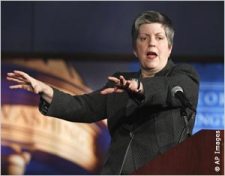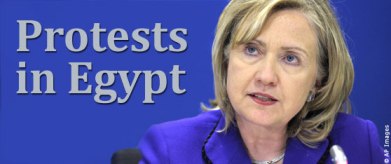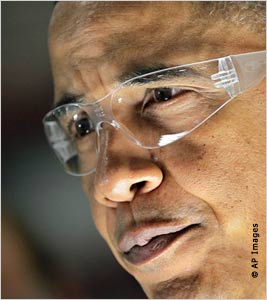The Obama administration says America’s founding principles are guiding its approach to the unrest in Egypt. The U.S. must work with Middle Eastern countries to spread democracy, a top U.S. diplomat says. The U.S. trade representatives calls for a free trade agreement with South Korea. Though al-Qaida has been weakened, terrorism remains the top threat to the U.S. Can the world be fossil fuel free by 2050?
 Democracy in the Middle East
Democracy in the Middle East
(mobile version)
The Obama administration says that its approach to the situation in Egypt is being guided by American founding principles and by its desire to see the unrest be resolved in a manner that respects the universal rights of the Egyptian people. “The Egyptian people are going to be the drivers of this process,” said President Obama’s Deputy National Security Advisor for Strategic Communications Ben Rhodes. “[W]e don’t see this as a situation where we dictate outcomes.” At right, Egyptians in Tahrir Square watch Obama’s remarks.
Spreading Democracy in the Middle East
(mobile version)
It’s more important than ever that the United States work with Middle Eastern countries to “democratize and open up political systems, economies and societies,” says Deputy Secretary of State James Steinberg in testimony before the House Foreign Affairs Committee.
South Korean Trade Deal
(mobile version)
U.S. Trade Representative Ron Kirk urges Congress to enact a free trade agreement (FTA) with South Korea this spring. South Korea is the United States’ seventh largest trading partner and has the 15th largest economy in the world. The FTA is expected to boost bilateral trade by billions of dollars and help create tens of thousands of jobs in both countries.
Terrorism Still Top Threat to U.S.
(mobile version)
The top U.S. intelligence officer says terrorism remains the greatest threat to the nation, though the al-Qaida terrorist group has been weakened. “We’ve apprehended numerous dangerous actors throughout the world and weakened much of al-Qaida’s core capabilities, including its operations, training, and its propaganda,” says Director of National Intelligence James Clapper.
 Fossil Fuel Free by 2050
Fossil Fuel Free by 2050
(mobile version)
The world has the technical know-how and financial capability to run entirely on renewable energy by the middle of this century, two California researchers say. Mark Jacobson of Stanford University and Mark Delucchi of the University of California–Davis say a large-scale transformation of the world’s energy systems to wind, solar, water, geothermal and other renewable sources would not cost substantially more than continued reliance on conventional power generation.




 Black History Month
Black History Month


 The Panda Program
The Panda Program








